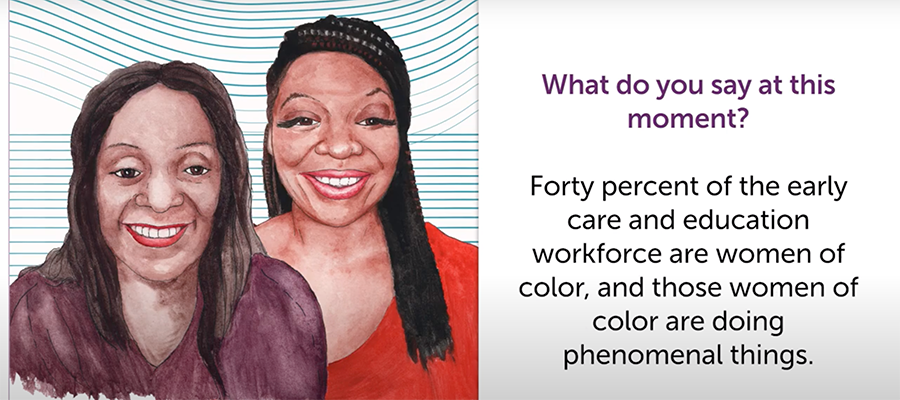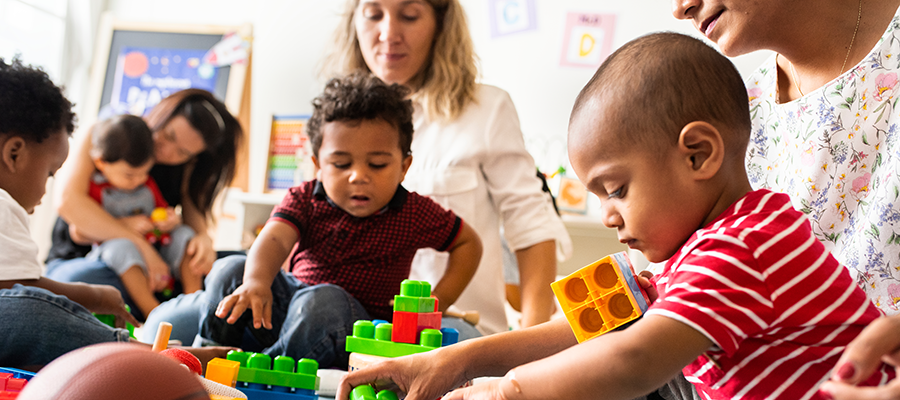
StoryCorps, a national nonprofit whose mission is to record, preserve and share the stories of Americans from all backgrounds, and Child Care Aware® of America recently partnered on a project to interview child care providers. The providers were asked about their personal journey in the child care field and the impact of COVID-19 on their work and life.
What follows is the transcript of a conversation between family child care provider Jerletha McDonald and her mentor, Valora Washington. Jerletha shares her experiences as a provider, including her work advocating for women of color in the industry. She is working to ensure Black women are recognized for their innovation and contributions to the early care and education industry, which includes closing pay and respect gaps.
Jerletha McDonald talks with her mentor Valora Washington about her experiences as a child care provider, including her work advocating for women of color in the industry. Jerletha is working to ensure Black women are recognized for their innovation and contributions to the early care and education industry, which includes closing pay and respect gaps.
Valora: You came as a family child care provider, which is really one of the least prestigious parts of our field, but everybody noticed you. You’re a black woman walking in the room with natural hair, all six feet of you. How do you do that?
Jerletha: I guess it came from the confidence that my grandmother installed in me in knowing that I was good enough. Sometimes we’re talking about all the problems that we have. My grandmother used to say, “Well, what are you going to do about it?” So that’s where my leadership comes from.
Valora: There’s a lot more people of color in this work than there used to be. But with COVID-19, our whole field is collapsing. And I know that it impacts you personally in terms of the funding, especially in family child care, where people can’t afford to do this work anymore. What do you say at this moment?
Jerletha: 40% of the early care and education workforce are women of color, and those women of color are doing phenomenal things. I know providers all across the United States who are implementing new programs. But COVID has really changed the game.
Valora: It’s changing the game for our children and what our children need. We give less resources to children from birth to five than we give to older children. Why the gap?
Jerletha: This is what I think. The early care and education workforce being 40% women of color—that’s the gap right there. We’re already not valued because this is a profession ran by women and we’re not taken seriously. They’re just women over there doing women’s work. No, this is not women’s work. This is society’s work. This is America’s work, right?
Valora: I like the way you talked about this as America’s work. Children of color are now the majority of the nation’s children. And so we cannot afford for these gaps between knowledge and behavior and action and policy to exist because it’s going to be difficult for our nation if that is the case. How can my generation of early childhood specialists support your generation?
Jerletha: It means everything to me to have women like you giving us encouragement. It’s not easy for women who look like me, who are walking into these boardrooms and saying, “Hey, this is Jerletha McDonald with the natural hair and this is who I am.”
What I want to say to providers going through this tremendous time: it’s going to be okay. Keep on doing what you’re doing. And like my grandmother used to say, “Who says you can’t?” Nobody. Our profession has the most precious asset in the whole United States, in the whole world, and that is the child. And so the world needs to look at it that way. And then maybe the thinking will change, like, wow, they are raising our children.
The StoryCorps/CCAoA project was made possible with support from the Robert Wood Johnson Foundation.




